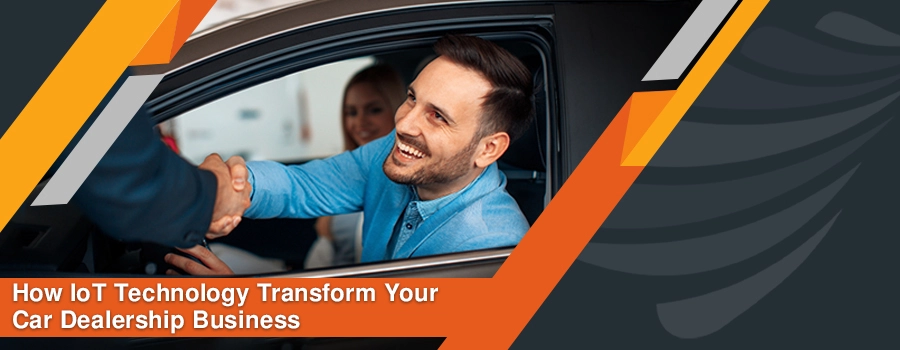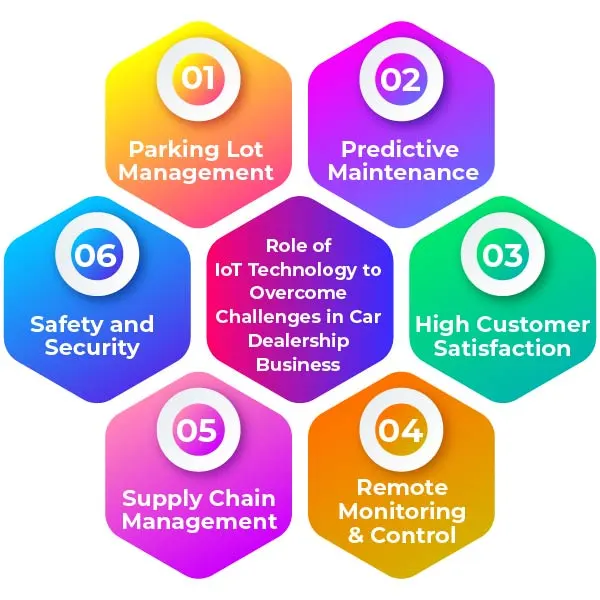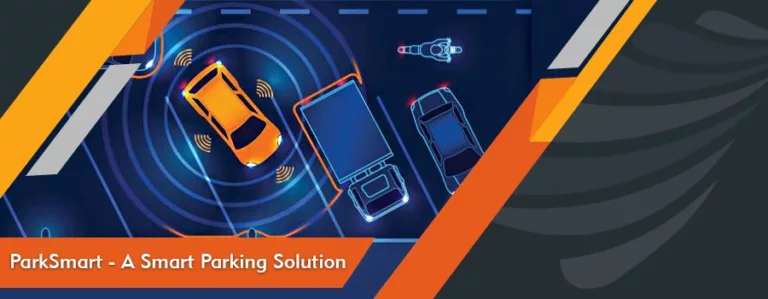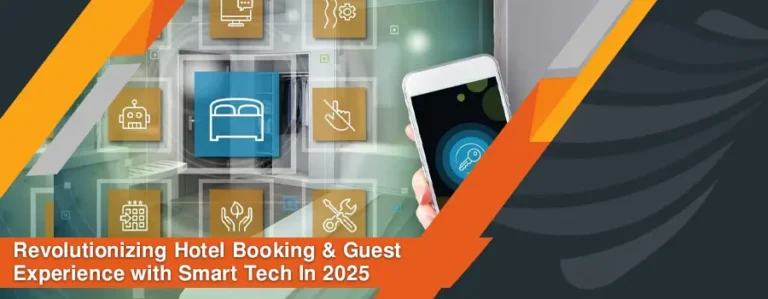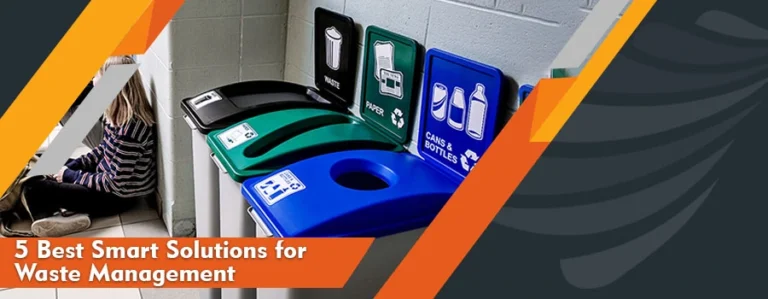Car dealerships always look for new and creative methods to stay ahead of the curve and satisfy customers’ ever-changing needs. The Internet of Things (IoT) is a technology revolutionizing how auto dealerships run.
We welcome you here to help you understand how Internet of Things (IoT) technology transforms the automobile dealership industry and how you can use it to drive success in your dealership business.
What is a Car Dealership Business?
The car dealership business involves selling new or used cars at the retail level under a dealership contract with an automaker or its sales subsidiary. Car dealerships offer comprehensive services such as financing, maintenance, repair, and selling spare parts.
As of 2023, the USA car dealership industry had 130,152 used car dealerships, showing market saturation. Therefore, businesses need to adopt unique strategies to grab the market. Successful dealerships invest in advanced technology trends to increase customer satisfaction and gain a competitive advantage in the automotive market.
Challenges in Car Dealership Business
The major challenges businesses face in car dealerships are:
1. Customer Satisfaction Management
Understanding customer demand and meeting customers’ high expectations remain challenging in car dealerships. From initial inquiry to test drive and post-purchase service, customer representatives need a different strategic approach to deal with customers.
2. Technological Expectations
Customers interested in innovative experiences expect a seamless digital experience from car selection to purchase. Companies need more research and technological integration face to meet customer expectations. Also, companies need to train staff and invest in advanced technological solutions to gain high customer interest.
3. Parking Lot Accessibility and Organization
Car dealers need help finding parked cars in dealership lots. This causes service delays, which leads to customer frustration. Lack of technological integration and digital practices also causes efficient management and poor service delivery.
4. Security Concerns
Security concerns within and around dealership premises are crucial challenges. Protecting valuable inventory from damage or theft requires robust security measures, a strong surveillance system, and technological upgrades. For the success of the car dealership business, ensuring the security of staff, customers, and assets is crucial.
What is IoT Technology?
The Internet of Things (IoT) is a network of interconnected devices that share data and communicate via the Internet. These devices have sensors, actuators, and other technologies that exchange and collect data to achieve specific objectives. Data sharing and connectivity make IoT technology an important part of upgrading practices in the automotive industry.
Role of IoT Technology to Overcome Challenges in Car Dealership Business
IoT technology plays a major role in overcoming challenges in car dealerships:
1. Parking Lot Management
IoT parking sensors can track the parked car’s location in real-time, allowing client dealers to quickly locate vehicles for customer inspection and purchase. The seamless integration of the IoT system enhances customer satisfaction by ensuring that the desired car is readily available.
Top of Form
2. Predictive Maintenance
Data collected from the sensors is transmitted to the central system, where controllers can access it. With AI algorithms, these controllers can analyze the data to anticipate potential risks and future maintenance, making it possible to prevent issues before they occur and keep customers satisfied.
3. High Customer Satisfaction
IoT devices can also personalize customer experiences by offering recommendations based on their interests, preferences, and previous purchases. Also, on the mobile app, car dealers can show customers all the cars according to their demands and specifications.
4. Remote Monitoring and Control
Car dealers can remotely monitor and control various aspects of their operations, such as HVAC systems, lighting, and security systems, enhancing energy efficiency and cost savings.
5. Supply Chain Management
IoT technology can track vehicles from manufacturing sites to dealerships in real-time, ensuring security and reducing the risk of delays or disruptions.
6. Safety and Security
IoT devices can enhance the safety and security of vehicles parked in the dealership parking lot, providing features like theft prevention, real-time alerts, emergency response, and remote vehicle tracking.
Use Case of IoT Technology Transforming Car Dealership Business
The integration of IoT technology has proven to be a game changer in the car dealership world, where customer satisfaction is paramount, and time is of the essence. Conure CHIRP, a smart car dealership solution, is an example of this transformation. It is a state-of-the-art IoT solution designed to streamline the car selection process, enhancing the overall customer experience.
CHIRP eliminates the need for sales associates to manually locate the desired vehicles in large parking lots, which can lead to extended wait times and client frustration. By leveraging IoT technology, CHIRP rapidly locates vehicles and provides information on the mobile app, making the car-buying process efficient and stress-free.
How Does CHIRP Work?
The CHIRP system comprises a complex network of parking sensors, Bluetooth devices, a centralized system, and an intuitive application. Sensors are installed in each parking spot to communicate real-time data and identify cars’ availability in the specified location. Every car has a Bluetooth device that communicates with these sensors to update the parking space status whenever a car moves in or out.
After being processed, this data is directed into a centralized system and made available through a web or mobile application. Users rely on this app as their fulcrum since it makes finding and managing cars on various devices simple, making their dealership experience quick and easy.
Benefits of Integrating Smart Car Dealership Solution
The benefits of using smart car dealership solutions are:
Real-Time Updates:
CHIRP’s system offers fast updates on parking space occupancy, enabling customers and dealers to quickly locate open spots or vehicles.
Vehicle Location:
The technology accurately tracks the vehicle within the lot, making it possible to retrieve it quickly and removing the inconvenience of going through rows of automobiles.
Automated Notifications:
Users are kept up to date in real-time by receiving instant alerts concerning noteworthy events, such as shifts in the occupancy of parking spaces or vehicle movement.
Effective Lot Management:
Dealerships receive information on how parking spots are used, which helps with inventory control and streamlines processes for a positive customer experience.
Assurance of Security: CHIRP improves lot security by tracking unwanted vehicle movements and lowering the possibility of theft or misplacement.
Data-Driven Decisions: By leveraging CHIRP’s analytical powers, decision-makers can gain insightful knowledge about customer behavior, inventory levels, and dealership performance.
What is the Future of Car Dealership?
Advances in technology, changing consumer preferences, and a focus on sustainability will all have a major impact on the future of the car dealership. The following major ramifications and developments might completely alter the landscape of auto dealerships:
1. Digital Integration and Online Sales
As more platforms become available online, virtual showrooms and digital sales procedures will become commonplace. Dealerships will use more digital tools, such as augmented reality (AR) and virtual reality (VR), to provide clients with immersive online experiences that let them explore and modify cars from their homes.
2. IoT and Connected Cars
As IoT technology becomes more integrated into dealership operations, it will improve inventory management, car diagnostics, and maintenance. Thanks to connected automobiles, dealerships can offer preventative maintenance services, which offer real-time data sharing and improve customer service and vehicle lifespan.
3. Sustainability and Electric Vehicles (EVs)
As a result of the global push for sustainability, EV demand is expected to increase. Dealerships will have to change by adding more EV models to their inventory, setting up infrastructure for charging and educating employees about the advantages and technologies of EVs. Energy-efficient buildings and sustainable business practices will also impact dealership operations.
4. Autonomous Vehicles
Dealerships will begin offering self-driving cars as autonomous driving technology develops, altering the test-driving and client education process. This change will also affect services and necessitate updating insurance and regulatory frameworks.
5. Personalization
Dealerships will use big data and artificial intelligence to provide customized customer experiences. Predictive analytics will improve customer engagement and loyalty by enabling personalized service reminders, accurate vehicle recommendations, and targeted marketing.
6. Mobility Services and Subscription Models
The idea of owning a car is changing to accommodate more flexible mobility options. Dealerships may provide subscription services, which reflect shifting consumer preferences toward flexibility and convenience and give clients access to various vehicles for a fixed monthly fee.
7. Enhanced Cybersecurity
Cybersecurity will be emphasized more as connected cars and internet sales platforms proliferate. Dealerships must implement strong security measures to guard vehicle systems and client information against online attacks.
8. Regulatory and Ethical Considerations
Regulations about digital sales, data privacy, and vehicle technology, among others, will impact how auto dealership models develop over time. Ethical issues, especially regarding AI and data use, will also influence dealership operations. Ethical regulations will be upgraded to meet future demand.
Final Thoughts
IoT technology can potentially revolutionize car dealership operations. With IoT-driven smart car dealership solutions, dealerships may increase lot security, simplify inventory management, and provide individualized customer experiences. With IoT devices like parking sensors, Bluetooth trackers, and centralized systems, smart car dealership solutions eliminate the need to manually search the lot for specific vehicles. With automated notifications and efficient lot management, dealerships may maintain competitiveness in the rapidly evolving automobile sector and give clients a smooth and pleasurable experience.

